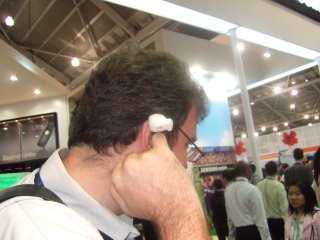Howard Stringer is the new CEO at Sony and is in charge of their turn around. He was interviewed by the WSJ's Walt Mossberg. Note the importance of controlling the software--it is the means by which you control the customer experience. Here are some excerpts which further expound on the theme of our course:
Mr. Mossberg: Consumer electronics in his [Jobs's] mind can be thought of as software in a box, and that has not been your strength. You've been primarily a hardware company. What have you done about this problem?
Mr. Stringer: I spent a lot of my first year pushing on software. Now, Sony makes 3,000 stand-alone products and 50,000 SKUs, so part of our problem is we're this giant department store, ostensibly an analog department store, cranking out all these things that the world wants but for which we don't always get credit in the stock market. We actually have a lot of brilliant software engineers, but they create embedded software. We have had a great problem with application software. We never did it, as you know, with a digital Walkman, which we didn't even release here because we actually didn't want to give it to you.
Mr. Mossberg: Oh, thanks.
Mr. Stringer: We gave it to the rest of the world and retailers were very upset with it. It was a beautiful product, a purple device, wonderful-looking information on it. Very elegant in software and the two doormen in my building think it's absolutely great. But it's limited because we didn't sit down and have a systematic plan to build applications across the software-development program or software platform and furthermore, it's a weakness of Sony's ... Why am I confessing?
Mr. Mossberg: Good, keep it coming.
Mr. Stringer: We didn't bring software engineers into the product development at the beginning. The engineers would begin the product and then software would come after the fact. And that's because in a company that has jobs for life, the older people are at the top and the younger software engineers, of which there are many, are on the bottom, pushing up. So there's a kind of a generation gap, which we've worked really hard to eliminate in the last four months. We're going to transform Sony quite radically in the next 12 months.
Mr. Mossberg: Let's talk about the Sony Reader, which is a new and quite different e-book device. ... This is not just a device. You have to pull off something sort of akin to iPod and iTunes with this, where you have a device people like, at a price they will pay, and very good software on the computer to handle it and then a good service with a lot of content where the DRM [digital rights management] isn't too intrusive.
Mr. Stringer: You're right, that's a lot of pieces to put [together], that sort of end-to-end model that Gates was saying no one wants, but everyone does, actually. I've put my name on this damn thing. I'm a reader. I know that's an odd phenomenon these days, but I carry books all around the world, so when I saw this I fell in love with this device. The fact that you can store 80 books on this and more on the memory stick, the fact that its battery life is seven-and-a-half thousand pages, which means about 25 books. ... The publishers love this ... Dan Brown [author of "The Da Vinci Code"] endorsed this at the Consumer Electronics
Mossberg: You are in so many businesses that clearly you have a wide variety of competitors.
Does Samsung [Electronics Co.] rank as a particularly important competitor?
Mr. Stringer: Samsung is a first rate company and they have a wealth of revenue coming from other areas. But I think in the high-definition world, which is clearly our strategy for this year, we have still an advantage. Blu-ray is part of the high-definition strategy and then we have the 4K projector [called SXRD], which we're demonstrating in California this week. We have the digital camera, which we make with Panavision. We have high-definition Bravia [TVs], high-definition rear projectors, and we have a high-definition camcorder which is the world's best selling camera. So our strategy is sort of circling the globe with high definition -- we think we're poised for the high-definition miracle.
Sony is a target for everybody. We have more competitors than you've had hot dinners. ... The truth is, one of the things I did ... was eliminate some of those SKU's because it's exhausting trying to win on every front. Every engineer loves his own product, so if you have an electronic toothbrush with a camera, we would give the same amount of marketing to that as everything else. After awhile the company sinks, exhausted, to its knees. Well, we've changed that.


